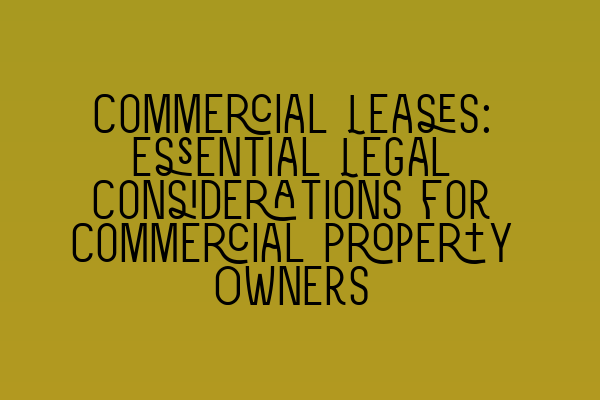Commercial Leases: Essential Legal Considerations for Commercial Property Owners
Commercial leasing is a complex area of property law that requires careful consideration by both landlords and tenants. As a commercial property owner, it is crucial to understand the essential legal considerations involved in leasing your property to ensure your interests are protected and the lease agreement is fair and enforceable. In this blog post, we will discuss some key legal considerations that every commercial property owner should be aware of.
1. Negotiating and Drafting the Lease Agreement
The lease agreement is the foundation of any commercial lease and it is important to ensure that it is drafted accurately and reflects the intentions and expectations of both parties. It is advisable to engage the services of a qualified solicitor with expertise in property law to assist in negotiating and drafting the lease agreement. This will ensure that all legal requirements are met, and the lease agreement is legally binding and enforceable.
It is essential to include key terms and provisions in the lease agreement, such as the duration of the lease, rent payment terms, responsibilities for maintenance and repairs, and any restrictions or permissions on the use of the property. These terms should be clearly defined and agreed upon by both parties to avoid potential disputes in the future.
For a comprehensive understanding of lease agreements and the legal implications, consider taking SQE property law courses.
2. Rent and Rent Reviews
The issue of rent is a critical aspect of any commercial lease. As a landlord, it is important to determine the appropriate rent for your property based on market rates and negotiations with the tenant. Rent reviews are also an important consideration, as they allow for adjustments to the rent during the term of the lease. It is crucial to include provisions for rent reviews in the lease agreement to avoid any disputes or disagreements regarding rent increases.
If you want to test your knowledge on property law, take a look at some SQE 1 practice exam questions.
3. Repair, Maintenance, and Alterations
The lease agreement should clearly specify the responsibilities for repair and maintenance of the property. It is common for commercial leases to place the responsibility for repairs and maintenance on the tenant. However, the extent and scope of these obligations should be clearly defined to avoid any confusion or disputes. Additionally, the lease should also address any restrictions or permissions for alterations or improvements to the property, and whether the landlord’s consent is required for such changes.
To prepare for the SQE 2 exam, consider enrolling in SQE 2 preparation courses that cover property law topics.
4. Use and Assignment
The permitted use of the property is an important consideration for both landlords and tenants. The lease agreement should clearly define the permissible use of the property and any restrictions on its use. This is to ensure that the tenant uses the property for its intended purpose and complies with any legal or regulatory requirements associated with the property.
Assignment provisions should also be carefully considered. These provisions outline the circumstances in which the tenant may assign or sublet the property to another party. As a landlord, it is important to have control over who occupies the property and to impose certain conditions on any assignment or subletting.
5. Termination and Renewal
The lease agreement should outline the conditions and procedures for termination and renewal of the lease. It is important to establish notice periods and procedures for termination to allow for orderly transitions and to avoid disputes. Renewal provisions should also be included to provide the tenant with the option to renew the lease at the end of the term, subject to negotiated terms and conditions.
To stay updated with the SRA SQE exam dates, check out the upcoming SQE 1 and SQE 2 exam dates.
Conclusion
Commercial leases require careful consideration and attention to detail to ensure that the lease agreement is fair, enforceable, and protects the interests of both landlords and tenants. By understanding the essential legal considerations involved in commercial leasing, you can navigate the process more effectively and mitigate potential risks and disputes. It is always advisable to seek the guidance of a qualified solicitor with expertise in property law to ensure that your lease agreement meets all legal requirements and provides appropriate protections for your commercial property.
